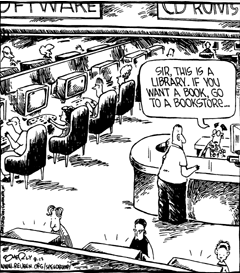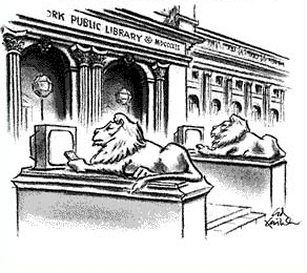
Signs of the times?
Two cartoons from library-related websites in the USA (original sources unknown). The one on the right apparently appeared in 'The New Yorker' about 10 years ago.

The People's Network - the saga continues.
The primary aim of the original webpage devoted to this topic was to encourage independent investigation and reporting of how Lottery 'good causes' money is spent in the UK. It was argued that the People's Network (PN) scheme cost far too much and that insufficient thought was given to both its implementation and consequences. A shortened version of the original report is available.
|
Signs of the times? Two cartoons from library-related websites in the USA (original sources unknown). The one on the right apparently appeared in 'The New Yorker' about 10 years ago. |
 |
The primary aim of this page is to highlight the impact of People's Network computers on UK public libraries. The overall ambiance of many libraries has been changed, arguably for the worse. This is glossed over in the 'hype' that continues to issue from both Resource (now rebranded as MLA: "Museums, Libraries and Archives Council) and the DCMS (Dept of Culture, Media and Sport). Some local library authorities seem equally besotted with the idea of attracting more patrons, even if they only play disruptive 'arcade' computer games and spend time writing trash emails - all of which arguably detracts from the peace and atmosphere of 'betterment' once enjoyed by many traditional library users. Many have complained, as have some computer users. In particular, different ideas on 'filtering' has led to websites being blocked in many public libraries that are freely available in others.
The government's declared aim of using the PN as a significant part of 'e-government' continues to be risible. A set of 'Questions for the Minister' is here in case she would care to respond!
Introduction of the so-called Peoples Network into UK libraries has transformed their ambience, largely because (and in most cases, out of necessity) the computers had to be located within or adjoining main areas of the library. All of the noise and disruption associated with use of the machines has therefore inevitably impacted upon other library patrons. All complaints have been swept aside by managers eager to embrace social inclusion and (they hope) the funding that it will continue to attract. Some have even enthusiastically embraced the idea of attracting drug users into libraries to play computer games. Many libraries now have the ambience of an amusement arcade as groups of often noisy teenagers use the computers for gaming or emailing. A few library users have already voiced dissent in newspapers - it is to be hoped more will follow. Writing in the Guardian, a left-of-centre UK broadsheet, novelist and critic D J Taylor echoed some of the sentiments previously expressed by the author Anne Fine. A report commissioned by Resource (now the Museums and Libraries Archive Council or MLA) and published in early 2004 contained the first 'official' recognition of some of these negative (and wholly foreseeable) consequences - the first published analysis was on this website, almost exactly a year earlier.
continue text here